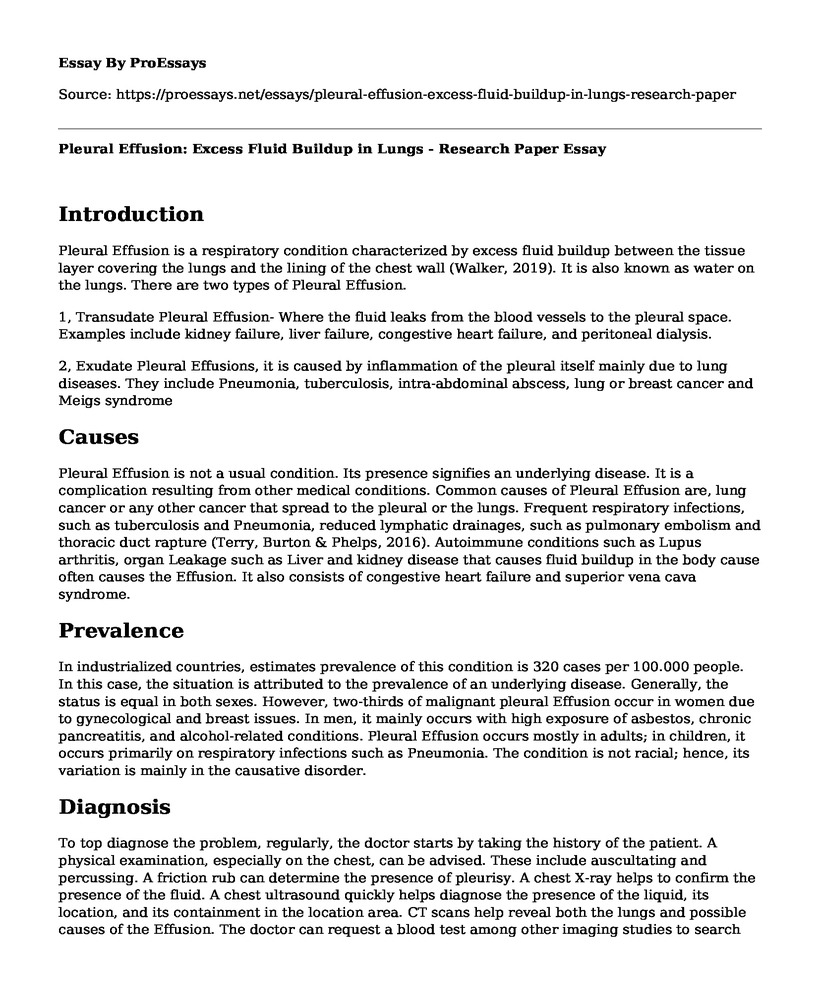Introduction
Pleural Effusion is a respiratory condition characterized by excess fluid buildup between the tissue layer covering the lungs and the lining of the chest wall (Walker, 2019). It is also known as water on the lungs. There are two types of Pleural Effusion.
1, Transudate Pleural Effusion- Where the fluid leaks from the blood vessels to the pleural space. Examples include kidney failure, liver failure, congestive heart failure, and peritoneal dialysis.
2, Exudate Pleural Effusions, it is caused by inflammation of the pleural itself mainly due to lung diseases. They include Pneumonia, tuberculosis, intra-abdominal abscess, lung or breast cancer and Meigs syndrome
Causes
Pleural Effusion is not a usual condition. Its presence signifies an underlying disease. It is a complication resulting from other medical conditions. Common causes of Pleural Effusion are, lung cancer or any other cancer that spread to the pleural or the lungs. Frequent respiratory infections, such as tuberculosis and Pneumonia, reduced lymphatic drainages, such as pulmonary embolism and thoracic duct rapture (Terry, Burton & Phelps, 2016). Autoimmune conditions such as Lupus arthritis, organ Leakage such as Liver and kidney disease that causes fluid buildup in the body cause often causes the Effusion. It also consists of congestive heart failure and superior vena cava syndrome.
Prevalence
In industrialized countries, estimates prevalence of this condition is 320 cases per 100.000 people. In this case, the situation is attributed to the prevalence of an underlying disease. Generally, the status is equal in both sexes. However, two-thirds of malignant pleural Effusion occur in women due to gynecological and breast issues. In men, it mainly occurs with high exposure of asbestos, chronic pancreatitis, and alcohol-related conditions. Pleural Effusion occurs mostly in adults; in children, it occurs primarily on respiratory infections such as Pneumonia. The condition is not racial; hence, its variation is mainly in the causative disorder.
Diagnosis
To top diagnose the problem, regularly, the doctor starts by taking the history of the patient. A physical examination, especially on the chest, can be advised. These include auscultating and percussing. A friction rub can determine the presence of pleurisy. A chest X-ray helps to confirm the presence of the fluid. A chest ultrasound quickly helps diagnose the presence of the liquid, its location, and its containment in the location area. CT scans help reveal both the lungs and possible causes of the Effusion. The doctor can request a blood test among other imaging studies to search for the underlying cause of the Pleural Effusion (Walker, 2019).
Signs and Symptoms
- Dry cough
- Fever
- Shortness of breath,
- Chest pains
- Difficulty in taking deep breaths
- Persistent hiccups
- Difficulty in breathing when lying down
Treatment
Depending on the type of Effusion, the doctor may need to treat the underlying cause only. Conditions such as Pneumonia, antibiotics clear the Effusion and diuretics for congestive heart failure (Kacmarek et al., 2016). If the effusions are large, draining is required to avoid future problems. Procedures for treatment include tube thoracostomy, where the doctor creates a small cut on the chest wall and puts a tube into the pleural space for several days. Pleural drain, where the Effusion keeps coming back, the doctor may put a catheter through the skin into the pleural space and will explain how and when to drain it while at home. The doctor treats the Effusion by injecting an irritating substance in the pleural space, causing the pleural and the chest tube to bind tightly to each other as they heal.
References
Walker, C. M. (2019). Pleural Effusion. Chest Imaging, 5(2), 165-170. doi: 10.1093/med/9780199858064.003.0029
Kacmarek, R. M., Stoller, J. K., Heuer, A. J., Chatburn, R. L., & Kallet, R. H. (2016). Egans fundamentals of respiratory care (11th ed.). St. Louis, MO: Elsevier.
Terry, D. J., Burton, G. G., & Phelps, T. H. (2016). Clinical manifestations and assessment of respiratory disease (7th ed.). Elsevier.
Cite this page
Pleural Effusion: Excess Fluid Buildup in Lungs - Research Paper. (2023, Feb 13). Retrieved from https://proessays.net/essays/pleural-effusion-excess-fluid-buildup-in-lungs-research-paper
If you are the original author of this essay and no longer wish to have it published on the ProEssays website, please click below to request its removal:
- Research Paper Example on the Management of Acute Viral Gastroenteritis
- How a Nurse Leader Helps a Nurse Colleague Pursue Their Professional Goals Essay
- The Symptoms of Alzheimer's Disease: Cognitive, Behavioral, and Psychological Manifestations - Essay Sample
- Essay Example on Pandemic Highlights Online Potential for Colleges and Universities
- Essay on Health Care Emergency Preparedness: A Hospital Emergency Manager's Role
- Essay Example on Overweight Predisposes Individuals to Cardiovascular Diseases: BMI Vital for Interventions
- Care Coordination Model - Report Example







